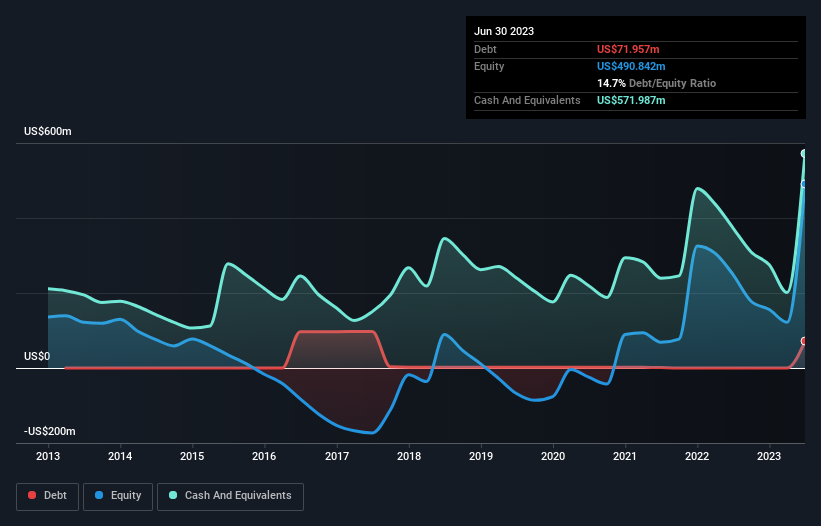
The external fund manager backed by Berkshire Hathaway's Charlie Munger, Li Lu, makes no bones about it when he says 'The biggest investment risk is not the volatility of prices, but whether you will suffer a permanent loss of capital.' When we think about how risky a company is, we always like to look at its use of debt, since debt overload can lead to ruin. We note that ImmunoGen, Inc. (NASDAQ:IMGN) does have debt on its balance sheet. But should shareholders be worried about its use of debt?
When Is Debt A Problem?
Debt is a tool to help businesses grow, but if a business is incapable of paying off its lenders, then it exists at their mercy. If things get really bad, the lenders can take control of the business. However, a more common (but still painful) scenario is that it has to raise new equity capital at a low price, thus permanently diluting shareholders. Of course, debt can be an important tool in businesses, particularly capital heavy businesses. When we examine debt levels, we first consider both cash and debt levels, together.
Check out our latest analysis for ImmunoGen
What Is ImmunoGen's Net Debt?
The image below, which you can click on for greater detail, shows that at June 2023 ImmunoGen had debt of US$72.0m, up from none in one year. But on the other hand it also has US$572.0m in cash, leading to a US$500.0m net cash position.

A Look At ImmunoGen's Liabilities
The latest balance sheet data shows that ImmunoGen had liabilities of US$93.7m due within a year, and liabilities of US$129.8m falling due after that. On the other hand, it had cash of US$572.0m and US$80.0m worth of receivables due within a year. So it can boast US$428.5m more liquid assets than total liabilities.
This short term liquidity is a sign that ImmunoGen could probably pay off its debt with ease, as its balance sheet is far from stretched. Simply put, the fact that ImmunoGen has more cash than debt is arguably a good indication that it can manage its debt safely. There's no doubt that we learn most about debt from the balance sheet. But it is future earnings, more than anything, that will determine ImmunoGen's ability to maintain a healthy balance sheet going forward. So if you want to see what the professionals think, you might find this free report on analyst profit forecasts to be interesting.
Over 12 months, ImmunoGen reported revenue of US$190m, which is a gain of 112%, although it did not report any earnings before interest and tax. So its pretty obvious shareholders are hoping for more growth!
So How Risky Is ImmunoGen?
By their very nature companies that are losing money are more risky than those with a long history of profitability. And the fact is that over the last twelve months ImmunoGen lost money at the earnings before interest and tax (EBIT) line. Indeed, in that time it burnt through US$266m of cash and made a loss of US$182m. But at least it has US$500.0m on the balance sheet to spend on growth, near-term. The good news for shareholders is that ImmunoGen has dazzling revenue growth, so there's a very good chance it can boost its free cash flow in the years to come. High growth pre-profit companies may well be risky, but they can also offer great rewards. There's no doubt that we learn most about debt from the balance sheet. But ultimately, every company can contain risks that exist outside of the balance sheet. These risks can be hard to spot. Every company has them, and we've spotted 2 warning signs for ImmunoGen you should know about.
At the end of the day, it's often better to focus on companies that are free from net debt. You can access our special list of such companies (all with a track record of profit growth). It's free.
If you're looking to trade ImmunoGen, open an account with the lowest-cost platform trusted by professionals, Interactive Brokers.
With clients in over 200 countries and territories, and access to 160 markets, IBKR lets you trade stocks, options, futures, forex, bonds and funds from a single integrated account.
Enjoy no hidden fees, no account minimums, and FX conversion rates as low as 0.03%, far better than what most brokers offer.
Sponsored ContentNew: AI Stock Screener & Alerts
Our new AI Stock Screener scans the market every day to uncover opportunities.
• Dividend Powerhouses (3%+ Yield)
• Undervalued Small Caps with Insider Buying
• High growth Tech and AI Companies
Or build your own from over 50 metrics.
Have feedback on this article? Concerned about the content? Get in touch with us directly. Alternatively, email editorial-team (at) simplywallst.com.
This article by Simply Wall St is general in nature. We provide commentary based on historical data and analyst forecasts only using an unbiased methodology and our articles are not intended to be financial advice. It does not constitute a recommendation to buy or sell any stock, and does not take account of your objectives, or your financial situation. We aim to bring you long-term focused analysis driven by fundamental data. Note that our analysis may not factor in the latest price-sensitive company announcements or qualitative material. Simply Wall St has no position in any stocks mentioned.
About NasdaqGS:IMGN
ImmunoGen
ImmunoGen, Inc., a commercial-stage biotechnology company, focuses on developing and commercializing the antibody-drug conjugates (ADCs) for cancer patients.
Exceptional growth potential with adequate balance sheet.


